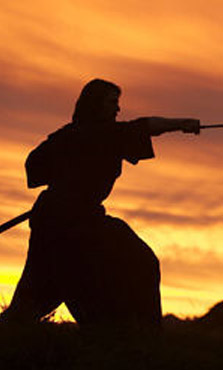 Tom Cruise never fails to give a satisfying performance, and his Captain Nathan Algren in Edward Zwick’s “The Last Samurai” is no exception. This is not because he is a great actor, but because he is a fully developed mediocrity. His range is limited—glibness alternating with earnest rage—but his motor is always redlining. Cruise’s boyish face is a battleground on which innocence and cynicism duke it out for control of his simple heart. Tom Cruise never fails to give a satisfying performance, and his Captain Nathan Algren in Edward Zwick’s “The Last Samurai” is no exception. This is not because he is a great actor, but because he is a fully developed mediocrity. His range is limited—glibness alternating with earnest rage—but his motor is always redlining. Cruise’s boyish face is a battleground on which innocence and cynicism duke it out for control of his simple heart.
That sort of dynamic is perfect for a brazen Hollywood epic like “The Last Samurai”, provided the lead has a solid foil off which to play. Fortunately Cruise has one in Ken Watanabe as the stoic Katsumoto, who gives the film its only real emotional honesty despite the fact that he, like the rest of his people, steadily recedes into Captain Algren’s shadow. By the end of the movie these tender-hearted rustics couldn’t have been any more enamored of Cruise if they’d been a village of Ben Stiller clones.
Fearlessly appropriating every shopworn beat in the old epic Western, Zwick has crafted a smartly paced romance with unavoidable, if shallow, multiplex appeal. The gravy train runs from “Shane” to “Dances With Wolves”, but more than any other the film resembles Ridley Scott’s “Gladiator”. The Hans Zimmer score, the blather about “the way of the warrior”, and the final shot of the humble hero returning home to his family are all taken with varying degrees of larceny from Scott’s epic.
Nothing too bad about that, but this occasionally adds an air of Oscar-trolling falseness to the proceedings. One readily credits Captain Abigail’s observation that the Japanese are a solicitous and courteous people, for instance, but one is certainly surprised to find that their kindness even carries over to combat, where such noted instruments of precision as Howitzers and Gatling guns fail to hit the one heroically yowling white guy leading a crowd of charging Samurai.
Too bad, because the movie had plenty of fascinating background material, particularly a peek at the agents of the infamous American military-industrial complex back when they were still called carpetbaggers. Whatever the triteness of “The Last Samurai”, Zwick and Cruise (who also produced) are to be congratulated for making a film that favorably depicts a small, grassroots rebellion fighting against the inexorable forces of soulless industrial tyranny in the form of American and Japanese technocrats. It’s not a tremendous leap to extend their criticism of “shameful” and “cowardly” battle tactics like nineteenth century cannons to twenty-first century smart bombs.
Admirable, too, is their honoring of the Emperor’s determination to run his country without the influence of meddling Americans. Would American audiences cotton to this as easily if the Emperor were, say, an Iraqi? There’s something disappointing in the fact that the rather brave political content of “The Last Samurai”—as it was in “Gladiator”—is consistently obscured by the Hollywood largesse to the point that it becomes almost nugatory. Striking at oblique angles is better than not striking at all, but one wishes that a movie might one day take on the truth of our world today, now, this minute, without relying on the golden haze of historical romances to soften the picture. |